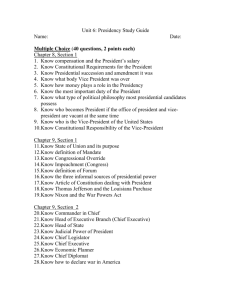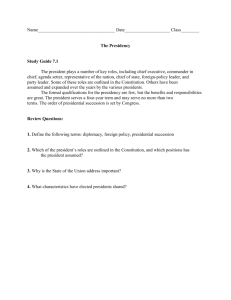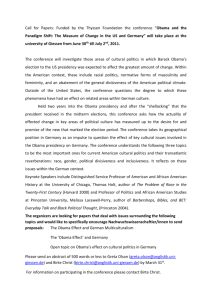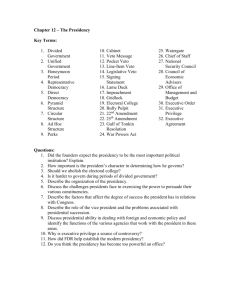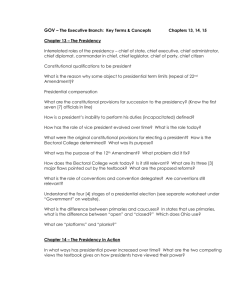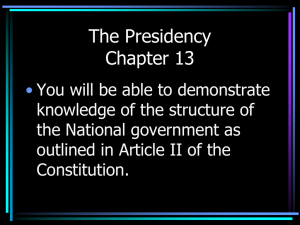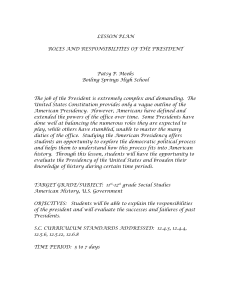The Presidency
advertisement
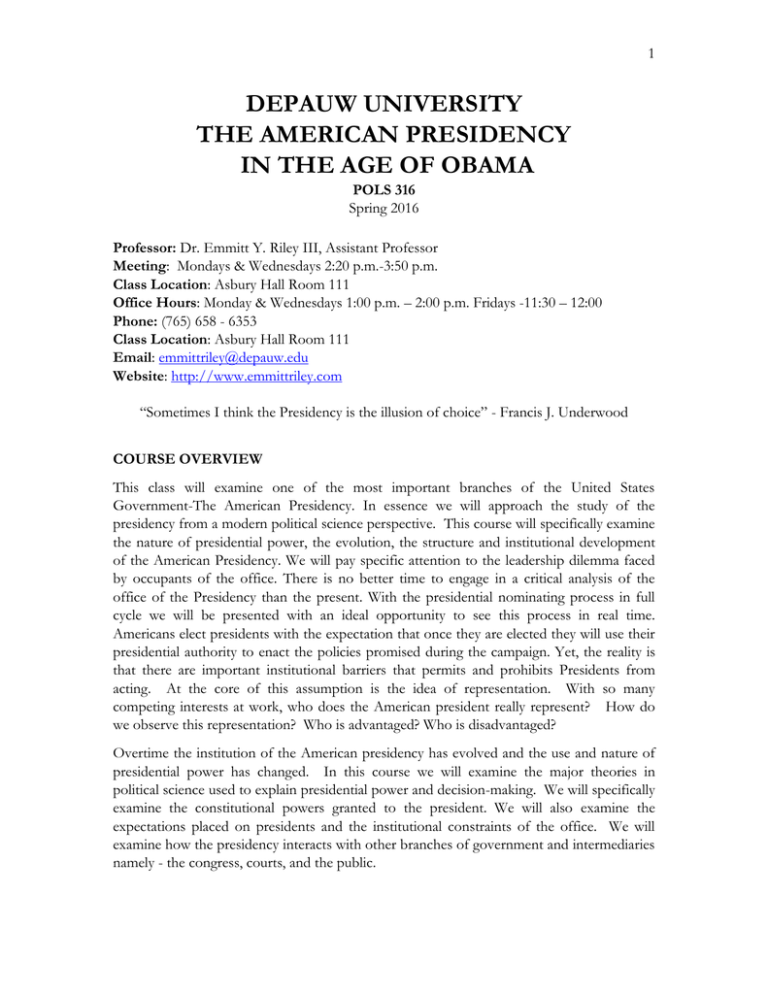
1 DEPAUW UNIVERSITY THE AMERICAN PRESIDENCY IN THE AGE OF OBAMA POLS 316 Spring 2016 Professor: Dr. Emmitt Y. Riley III, Assistant Professor Meeting: Mondays & Wednesdays 2:20 p.m.-3:50 p.m. Class Location: Asbury Hall Room 111 Office Hours: Monday & Wednesdays 1:00 p.m. – 2:00 p.m. Fridays -11:30 – 12:00 Phone: (765) 658 - 6353 Class Location: Asbury Hall Room 111 Email: emmittriley@depauw.edu Website: http://www.emmittriley.com “Sometimes I think the Presidency is the illusion of choice” - Francis J. Underwood COURSE OVERVIEW This class will examine one of the most important branches of the United States Government-The American Presidency. In essence we will approach the study of the presidency from a modern political science perspective. This course will specifically examine the nature of presidential power, the evolution, the structure and institutional development of the American Presidency. We will pay specific attention to the leadership dilemma faced by occupants of the office. There is no better time to engage in a critical analysis of the office of the Presidency than the present. With the presidential nominating process in full cycle we will be presented with an ideal opportunity to see this process in real time. Americans elect presidents with the expectation that once they are elected they will use their presidential authority to enact the policies promised during the campaign. Yet, the reality is that there are important institutional barriers that permits and prohibits Presidents from acting. At the core of this assumption is the idea of representation. With so many competing interests at work, who does the American president really represent? How do we observe this representation? Who is advantaged? Who is disadvantaged? Overtime the institution of the American presidency has evolved and the use and nature of presidential power has changed. In this course we will examine the major theories in political science used to explain presidential power and decision-making. We will specifically examine the constitutional powers granted to the president. We will also examine the expectations placed on presidents and the institutional constraints of the office. We will examine how the presidency interacts with other branches of government and intermediaries namely - the congress, courts, and the public. 2 While we will not study one single president, we will pay specific attention to the implications of the Obama Presidency on black politics and the American politics more broadly. By any measure, the historic election of President Barack Obama has significant implications for American Politics and has presented many scholars of black politics with an opportunity to revisit many of the core theoretical assumptions. GOALS AND EFFECTIVENESS: This course is writing and research intensive. Writing is an essential skill for success in the work force and post-undergraduate studies. We will work to develop and improve argumentative writing. At the end of this course you will be able to construct, defend, and refute arguments using the academic literature. All writing assignments and discussions must be predicated on a logical argument. This requires careful reading and digestion of the assigned literature. COURSE CONTENT AND INTELLECTUAL GROWTH: The content of this course requires us to think critically about the presidency. We all approach the study of the presidency from a modern political science perspective. For purposes of studying American politics you will be asked to think critically and scientifically. It is imperative that class discussions remain civil and grounded in academic and empirically sound research. I am not interested in partisan ideologically based opinions that cannot be supported or substantiated with empirical evidence. “Unfortunately, similar to the Monday morning (Sunday morning for college football fans) quarterback, politics is a field whereby many citizens have self-proclaimed themselves as experts, depending on which beauty salon/barbershop or bar they frequent. Hence, this course seeks to reduce the number of "doorstep" opinions by teaching students how to systematically search for the truth (i.e., carve away as much residual to get as close to the truth as possible) as it relates to the field of politics. The course will also place strong emphasis on positivist questions, which address "what is?" as opposed to questions based on the normative approach, which address "what ought to be?" (Orey 2006, 236). We will read and analyze a variety of different academic works that will require us to engage in serious intellectual conversations that will some time challenge long standing assumptions. Understanding American presidency requires us to think about some basic issues. How was the presidency envisioned by the framers of the Constitution? How has the presidency evolved into its modern role at the center of American politics? How do presidents relate to Congress, the courts, the public, and other political actors? How do presidents cope with the challenges and constraints placed on them by the Constitution, history, and their predecessors? How does the institution of the presidency limit or enhance a president to fulfill the expectations placed on the office by the public? How has the Obama Presidency challenged the assumptions of black politics? 3 How has the Obama Presidency impacted American politics specifically the electorate and public opinion? We will explore these issues by discussing four primary books and a number of scholarly works that offer variety of perspectives on American Politics. REQUIRED TEXT (S) o Michael Nelson. 2009. The Presidency and the Political System, 9th Ed. CQ Press. o Richard E. Neustadt. 1990. Presidential Power and the Modern Presidents: The Politics of Leadership from Roosevelt to Reagan. Free Press. o Stephen Skowronek. 2011. Presidential Leadership in Political Time: Reprise and Reappraisal. University Press of Kansas. o Randall Kennedy. 2011. The Persistence of the Color line: Racial Politics and the Obama Presidency. GRADING SCALE A 100-95, A- 94-90 B+89-87, B 86-83 B- 82-80, C+ 79-77 C 76-73, C- 72-70 D+ 69-67, D 66-63 D- 62-60, F 59-0 WHAT GRADES MEAN: A= Work that goes beyond the requirements of the assignment by adding insight, creativity and/or particularly thoughtful analysis. Demonstrates a comprehensive command of the course material, and exceptional ability to apply concepts to the real world, and a superior ability to organize and express ideas. B=Work that adequately meets the requirements of the assignment. Demonstrates a solid command of the course material, an ability to apply concepts to the real world with only minor problems, and good organization and expression of ideas. C= Work that partially meets the requirements of the assignment. Demonstrates acceptable command of the course material, a basic ability to apply concepts to the real world with some gaps and problems, and moderate skill in the organization and expression of ideas. D=Work that marginally meets the requirements of the assignment. Demonstrates little command of the course material, minimal attempt to apply concepts to real world, and limited ability to organize and express ideas. F= Work that does not meet the requirements of the assignment. Demonstrates no command of the course material, unable to appropriately or consistently apply concepts to the real world, and insufficiently organizes and expresses ideas. (Taken from Professor Oware’s Syllabi 08-17-2015) 4 GRADE DISTRIBUTION Toward the end of the semester students often get concerned about their grades. In an effort to help students keep track of their grades I have included in this syllabi a chart that will help you calculate your own average. Please be advised that you should utilize the percentages categories to determine your specific average. Argumentative Short Papers 15% Research Proposal 30% Quizzes 10% Exams 25% Class Participation 10% Research Presentation 10 % Argumentative Short Essays Papers Total (3) 15% Each student will be required to write a total of 3 short argumentative essays. Each essay must be a minimum 2 pages with .1 margins and 1.5 line spacing. Because this course is writing intensive each essay must conform to the basic standards of academic writing and composition. Each essay must include five paragraphs with a clear thesis statement and topic sentences. Each essay should focus on a summative critique of the readings and the theories presented. The paper will examine rather or not the student found the information presented in the readings compelling. In the conclusion, the paper should raise important questions regarding the content and should address ideas that you have lingering questions about. Major Paper (Final Paper) 30% During the course of this semester you will have to complete a research proposal. This paper should conform to the Chicago Style Manuel. Research Proposal (30%) Each student will select a topic related to the American Presidency and write a well-written research proposal. Each proposal should be 12-15 pages. Research proposals must be quantitative. See Chicago Manuel for formatting. You are prohibited from using footnotes as citations. Listed below are essential elements of the proposal. Introduction (Research Question) 5 Literature Review Proposed Methods o Data Source o Hypotheses o Dependent Variable o Independent Variables Expected Results Expected Findings Quizzes 10% - All quizzes will be unannounced. These quizzes will cover the assigned readings. Exams 25% - All exams will be closed book. Class Participation 10% You are required to complete all readings prior to attending class. I will grade participation based on how regular you contribute and the level at which your comments contributes to a substantive understanding of readings. Attending class does not constitute class participation. Each student will be responsible for preparing a set of discussion questions during the week that your argumentative essays are due. These questions will guide the discussion for each topic covered. There should be at least 6 discussion questions and these questions should be based on the assigned readings. Your questions can focus on the arguments, implications, conclusions, and criticisms of the readings. Your questions should also consider how the readings connect to current events. Part of your participation grade will also be how well you keep up with news relating to presidential politics. These reports are oral and should consider how the particular event is relevant to the constitutional authority of the president or any of the reading that we have examined. Quantitative Research Review Project /Presentation 10% Students will each do an oral presentation and a research report on SPECIAL TOPICS. Given the size of this class you will conduct this assignment in groups of two. The oral presentation will be accompanied by a written report. Noted in the course schedule is a list of special topics. You will select a topic and conduct research by consulting academic journals on the topic. You will be required to consult a minimum of 8 academic sources. The written report must contain the following components: 1. Introduction of Problem (This section should provide the context out of which the issue at hand is addressing) 2. Review of the Academic Research (This section should be a critical evaluation and review of the sources consulted for the project. What are the major debates in the literature? What do we know? What has the literature failed to address? ) 3. Methodology (It can also contain an evaluation of the methods, measurement for variables, hypothesis, and etc.) 4. Findings ((This section should discuss an overview of the data and what it tells us about the topic.) 6 5. Conclusion (Concluding thoughts, debates and recommendation for future research) Oral Presentation: On the dates noted on the syllabus you will be required to conduct an oral presentation to the class on the special topic. I am asking that you be creative. You are permitted to use power point presentation, poster presentations, video presentations or etc. You will be graded on both content and creativity. Presentations are limited to 10 minutes Graded Work Return Policy: I will work to return graded work in a timely fashion. There will be an 8 to 14 day turn around on assignments, essays, and papers. I encourage each of you to take advantage of office hours to discuss the substantive feedback on assignments. Help Outside of the Classroom: I want each of you to know that I am fully available to provide you with assistance outside of the classroom. I will devote two workshops outside of class that will be designed to assist you with your research proposals. The dates of these workshops will be announced in class. ACADEMIC DISHONESTY: In an academic community, the worst offense that can be committed is to cheat or plagiarize; neither will be accepted or condoned within this classroom. All material that is submitted must be your work or appropriately cited, if you have questions regarding citation procedure or when documentation is necessary — see me. Academic dishonesty, in any form, will be taken seriously. Such work will automatically receive a grade of F (“0”) and DePauw University’s policies will be followed. A second concern in the academic community is the freedom to discover inside and outside the classroom. Because this freedom should be equally available to all, harassment of any kind will not be tolerated. Types of Academic Dishonesty Cheating. Using or attempting to use unauthorized materials in any academic exercise or having someone else do work for you. Examples of cheating include looking at another student’s paper during a test, bringing an answer sheet to a test, obtaining a copy of a test prior to the test date or submitting homework borrowed from another student. Fabrication. Inventing or falsifying information. Examples of fabrication include inventing data for an experiment you did not do or did not do correctly or making reference to sources you did not use in a research paper. Facilitating academic dishonesty. Helping someone else to commit an act of academic dishonesty. This includes giving someone a paper or homework to copy from or allowing someone to cheat from your test paper. Plagiarism. Using the words or ideas of another writer without attribution, so that they seem as if they are your own. Plagiarism ranges from copying someone else’s work word for word, to rewriting someone else’s work with only minor word changes (mosaic plagiarism), to summarizing work without acknowledging the source. (See the Writing Center Guide to 7 Avoiding Plagiarism for further information on plagiarism.) Deception and misrepresentation. Lying about or misrepresenting your work, academic records or credentials. Examples of deception and misrepresentation include forging signatures, forging letters of recommendation and falsifying credentials in an application. Of particular concern, given the current popularity of collaborative projects, is taking credit for group work to which you did not contribute significantly or meet your obligations. In a collaborative project, all members of the group are expected to do their share. Group members may work together on each phase of the project or they may divide the tasks--one person might do background research; another might take charge of the lab experiments; another might be responsible for drafting the report. Even in a modular project, however, each member of the group is responsible for being familiar and involved with the entire project. Be sure to get clear instructions on your individual and collective responsibilities from each faculty member for each course. Electronic dishonesty. Using network access inappropriately, in a way that affects a class or other students’ academic work. Examples of electronic dishonesty include using someone else’s authorized computer account to send and receive messages, breaking into someone else’s files, gaining access to restricted files, disabling others’ access to network systems or files, knowingly spreading a computer virus or obtaining a computer account under false pretenses. Carelessness. When does carelessness become dishonesty? Students sometimes make minor mistakes in completing academic assignments. Mistyping one of many endnotes in a long paper, for example, may in most cases be considered a careless mistake, rather than an act of deliberate dishonesty. When students make multiple mistakes in acknowledging sources, however, these mistakes cannot be considered simply careless. Students who copy long passages from a book or a Web source, for example, make a deliberate choice to do so. Such students have taken a short cut; instead of explaining the source of their ideas, they have simply stolen ideas from others. In such cases, carelessness is a form of dishonesty. Students are responsible for knowing the academic integrity policy and may not use ignorance of the policy as an excuse for dishonesty. CELL PHONES/LAPTOPS: Turn off all cell phones!!! If you answer a cell phone in class you will be counted absent that day. Do not sit and send text messages during class. It is extremely rude and it will result in being counted absent. Also please reframe from utilizing laptops in the classroom unless otherwise instructed by the professor. Email Policy: Please allow 24 hours for me reply to email inquiries. I usually respond to all emails rapidly. 8 STUDENTS WITH SPECIAL NEEDS: DePauw University is committed to providing equal access to academic programs and university administered activities with reasonable accommodations to students with disabilities, in compliance with the Americans With Disabilities Act and Amendments (ADAAA). If you are a student who believes you may need an accommodation based on the impact of a disability or learning challenge you are strongly encouraged to contact Student Disability Services for further information on how to receive accommodations and support. Contact information for Student Disability Services is: 408 S. Locust Street, Suite 200, in The Memorial Student Union Building (765-6586267)(studentdisabilityservices@depauw.edu). Accommodations cannot be implemented until the faculty member has received the official ADA letter, released by Student Disability Services. It is critical that you schedule a time to discuss the implementation of the accommodations specified in your letter with each faculty member receiving the letter. Accommodations are not retroactive. Students with documented disabilities have the right to choose not to use accommodations, and in exercising that right, they accept the resulting outcomes. This means that faculty are under no obligation to retroactively address any issue arising from students' choices to forgo accommodations. REQUIREMENTS FOR TYPED DOCUMENTS: All typed documents must be formatted properly. They should adhere to the standards of the Chicago Style Manuel. If you need help regarding proper citation please see me. The document should include the following: 1 inch margins on all four sides, name, class, date, and title of document and the font size should be 12 points. NOTE TO STUDENTS: Please know that my job as a professor is to challenge you academically and intellectually. If you need to meet with me feel free to stop by my office and let’s have a chat. I am always open to an intellectual conversation and ways to help you navigate your college experience. If you need help do not hesitate to email, call, or setup an appointment. Next Page for Scheduled 9 The American Presidency Spring 2016 February 1 M Introductions Syllabi Review Expectations Questions February 3 W Ezra Klein. March 19, 2012. “The Unpersuaded: Who Listens to a President?” The New Yorker. http://www.newyorker.com/reporting/2012/03/19/120319fa_fact_klein Dyson, Micahel 2015. Whose President was He? http://www.politico.com/magazine/story/2016/01/barack-obama-racerelations-213493 Cameron, Charles. 2002. Studying the Polarized President. Presidential Studies Quarterly 32.4: 647-663. Creating the Presidency Declaration of Independence (Find Online)Constitution, Article I, II, III (Find online) Federalist 69, 70, 71 72 (Find online) February 8 M Approaches to the Presidency The Two Constitutional Presidencies by Jeffry Tulis February 10 W Approaches to the Presidency Studying the Presidency by Lyn Ragsdale Essays Due: Adams, Babinski, Barnes, Brown, and Browning Elements of Presidential Power Neustadt, Presidential Power and the Politics of Leadership, Chs. 1-3 Skowronek. 2010. The Development of Presidential Power: Conservative Insurgency and Constitutional Construction Elements of Presidential Power Neustadt, Presidential Power and the Politics of Leadership, Chs. 4-5, & pp. 128-135 Essays Due: Frode, Frimpong, Hansen, and John Exam I Elements of Presidential Power: Competing Theories of Presidential Power Skowronek. 2008. Presidential Leadership in Political Time. Chs. 1 & 2 Skowronek. 2008. Presidential Leadership in Political Time. Ch 3 Presentation 1: Presidential Personality Research Questions Due! Elements of Presidential Power Quirk. 2010. “Presidential Competence” (Ch. 4 in Nelson) February 15 M February 17 W February 22 M February 24 W 10 February 29 M March 2 W March 7 M March 10 W March 14 M March 16 W Nelson. 2010. “The Psychological Presidency” (Ch. 5 in Nelson) Essays Due: Mcdonald, Mogck, Morgese, Palmer, Peterson and Spratt Electing the President Laura Brown. 2010. The Presidency and the Nominating Process : Aspirants, Parties, and Selections Bush v. Gore (Review Case) Presentation 2: Presidential Approval Electing the President Edwards. 2010. The Faulty Premise of the Electoral College Essays Due: Taller, Tinder, Tipsword, Tarver, Whitlock and Adams List of Academic Sources Due! The Presidency and the Public Kernell, Going Public Chapters 1-2 Presentation 3: Presidential use of Executive Orders The Presidency and the Public Kernell, Going Public Chapter 3 Essays Due: Babinski, Barnes, Brown, Browning, Frode, and Frimpong. Data Source and List of Variables Due The Presidency and the Public Kernell, Going Public Chapters 4-5 Progress Reports due! Presentation 4: Presidents and Public Opinion Exam II The President and Congress Institutional Constraints: Congress and Divided Government Dickinson. 2010. “The President and Congress.” (Ch. 14 in Nelson) Quirk and Nesmith. 2006. “Divided Government and Policymaking: Negotiating the Laws” Casey B. K. Dominguez, “Is It a Honeymoon? An Empirical Investigation of the President's First Hundred Days,” Congress & the Presidency, Vol. 32, No. 1, (2009): 63-78. March 19-27 March 28 M March 30 W Essays Due: Hansen, John, McDonald, Mogck, Morgese and Palmer Proposed Methodology Due Spring Break The Institutional Presidency Burke. 2010. “The Institutional Presidency.” (Ch. 12 in Nelson) Lewis. 2011. Presidential Appointments and Personnel. Annual Review of Political Science. Presentation 5: Presidential Elections The President and the Courts Yalof. 2010. “The Presidency and the Judiciary.” (Ch. 15 in Nelson) “Obama v. Roberts: The Struggle to Come.” NYT April 16, 2010. 11 April 4 M Essays Due: Spratt, Taller, Tinder, Tipsword, Tarver, and Whitlock The Presidency and the Executive Branch Carl Lieberman. 1972. President Nixon and Reorganization of the Executive Branch. Social Science, Vol. 47, No. 4 (AUTUMN 1972), pp. 195-202 RICHARD W. WATERMAN. 2009. The Administrative Presidency, Unilateral Power, and the Unitary Executive Theory Presidential Studies Quarterly, Vol. 39, No. 1, The Administrative Presidency (March 2009), pp. 5-9 April 6 W April 11 M April 13 W Presentation 6: Racial Resentment and Obama DePauw Day of Inclusion Expert from Iris Young and the Politics of Difference Peggy McIntosh, Unpacking the Investable Knapsack Essays Due: Adams, Babinski, Barnes, Brown, Browning, and Frode The Vice Presidency Marie D. Natoli. 1982. Perspectives on the Vice Presidency. Presidential Studies Quarterly, Vol. 12, No. 4, Perceptions of the Presidency, Leadership and Statesmanship (Fall, 1982), pp. 598-602 Marie D. Natoli. 1988. The Vice Presidency: Stepping Stone or Stumbling Block? Presidential Studies Quarterly, Vol. 18, No. 1, The Presidency in a Bicentennial and Quadrennial Election Year (Winter, 1988), pp. 77-79 Presentation 7: Rally Around the Flag Theory The Vice Presidency JOEL K. GOLDSTEIN. 2008. The Rising Power of the Modern Vice Presidency. Presidential Studies Quarterly, Vol. 38, No. 3 (September 2008), pp. 374-389 GEORGE C. EDWARDS III, LAWRENCE R. JACOBS. 2008. The New Vice Presidency: Institutions and Politics. Presidential Studies Quarterly, Vol. 38, No. 3 (September 2008), pp. 369-373 April 18 M Essays Due: Frimpong, Hansen, John, McDonald, Mogock, Morgese, and Palmer. Exam III Obama: Expectations, Realities, and Polarization Kennedy. 2011. Chapters 1-2 McCormick. 2015. The Obama Presidencies and the Continuing Significance of the Racial Divide in American Politics Tesler, Michael. 2013. "The Return of Old Fashioned Racism to White Americans' Partisan Preferences in the Early Obama Era" Journal of Politics, 75(1): 110-123. Presentation 8: Obama and the Political Uses of Race 12 April 20 W Obama: Expectations, Realities, and Polarization Kennedy. 2011. Chapters 2-4 Tesler, Michael. 2012. "The Spillover of Racialization Into Health Care: How President Obama Polarized Public Opinion by Racial Attitudes and Race." American Journal of Political Science, 56(3): 690-704. Michael H. Cottman, “Cornel West's Obsession with Obama”, The Root, (May 29, 2012), http://www.theroot.com/buzz/cornel-westsobsession-obama. April 25 M Essays Due: Peterson, Spratt, Taller, Tinder, Tipsword Tarver, and Whitlock. The Historic Election of President Barack Obama Kennedy. 2011. Chapters 5-6 Hillary Crosley, “Cornel West: Obama a 'Republican in Blackface',” The Root (November 11, 2012), http://www.theroot.com/buzz/cornel-west-obamarepublican-blackface. Kevin Gosztola, “Cornel West’s Disgust with Obama Should Not Make Him a Pariah,” (May 18, 2011), http://my.firedoglake.com/kgosztola/2011/05/18/cornel-westsdisgust-with-obama-should-not-make-him-a-pariah/ Tesler, Michael and David O. Sears. 2010. “Is the Obama Presidency Post Racial? Evidence from his First Year in Office,” in Michael Tesler and David O. Sears. Obama’s Race: The 2008 Election and the Dream of a Post-Racial America. Chicago: University of Chicago Press. http://mst.michaeltesler.com/uploads/sample_4.pdf April 27 W Presentation 9: American Presidents and Foreign Policy The Obama Presidency and Black Intellectual Debate Kennedy. 2011. Chapters 7-8 Melissa Harris-Perry, “Cornel West v. Barack Obama,” The Nation (May 17, 2011), http://www.thenation.com/blog/160725/cornel-west-v-barack-obama. Chris Hedges, “The Obama Deception: Why Cornel West Went Ballistic,” Truthdig (May 16, 2011), http://www.truthdig.com/report/item/the_obama_deception_why_cornel_w est_went_ballistic_20110516. May 2 M Obama and the Politics of Race Mychal Denzel Smith, “What's behind Cornel West's beef with Obama?” (May 18, 2011), http://thegrio.cm/2011/05/18/does-cornel-west-have-an-obamacomplex/ 13 David Swerdlick, “Why Cornel West is Wrong About Obama The Root (May 19, 2011) http://www.theroot.com/views/why-cornel-west-wrong-aboutobama Krissah Thompson, “Cornel West’s criticism of Obama sparks debate among African Americans,” The Washington Post (May 18, 2011), http://m.washingtonpost.com/politics/cornel-wests-criticism-of-obamasparks-debate-among-africanamericans/2011/05/18/AFlGTf6G_story.html?wprss=rss_homepage Presentation 10: Presidential Nominations May 4 W Beyond Obama and the Politics of Race Dyson, Michael. 2015. Yes She Can, Why Hillary Clinton will do more for Black People Than Obama, A Skeptics Journey” https://newrepublic.com/article/124391/yes-she-can Dyson, Michael. 2015” Hillary Clinton Better for Black People than Obama? http://www.theroot.com/articles/politics/2015/11/hillary_clinton_better_for _black_people_than_obama.html Exam IV May 9 M May 11 W May 16 M May 18 W May 22 The Obama Presidency Kathleen Hall Jamieson, “How Well Has President Barack ObamaChosen from Among the Available Means of Persuasion?,” Polity (Dec., 2012): 3-6. K. Lewis, P. K. Ford Dowe, and Sekou M. Franklin, “African Americans and Obama’s Domestic Policy Agenda: A Closer Look at Deracialization, the Federal Stimulus Bill, and the Affordable Care Act,” Polity The Obama Presidency Ron Walters, “The Politics of Blackness,” Journal of Black Studies, Vol. 38, No. 1, (Sept., 2007): 7-29. B. Canes-Wrone and J. P. Kelly, “The Obama Presidency, Public PositionTaking, and Mass Opinion,” Polity (Dec., 2012) Final Meeting Research Proposals Due Graduation
